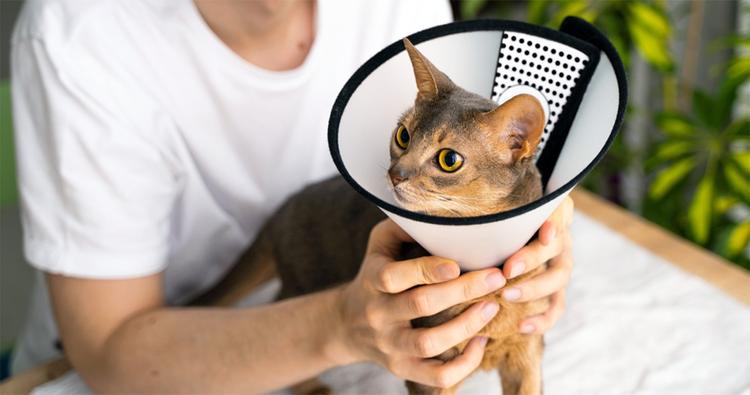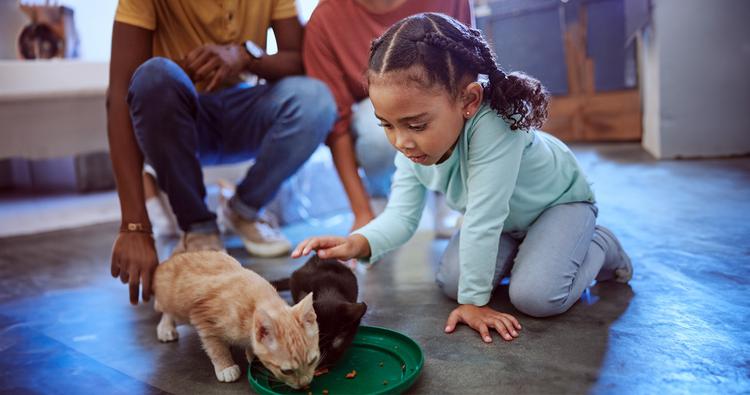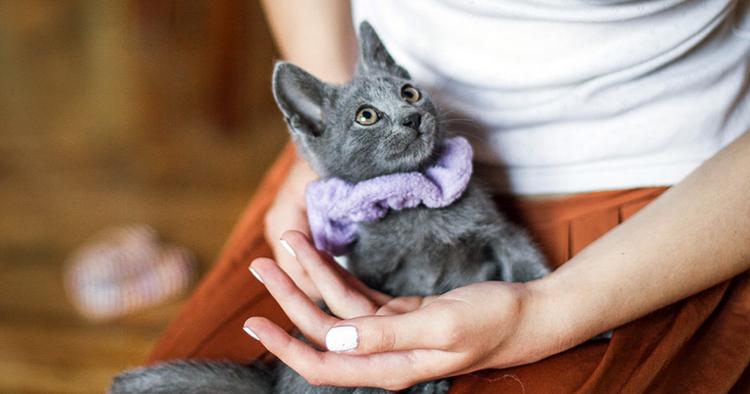10 Reasons Why You Should Adopt a Cat
Learn the many benefits of adopting a cat, and all the ways felines can enhance your life and home.
Learn the many benefits of adopting a cat, and all the ways felines can enhance your life and home.
by Savannah Admire, | December 7, 2024

Michela Ravasio / Stocksy
Whether in your neighborhood, at your workplace, or just around town, you’ve likely come across more than one stray cat. Around two to three million cats end up in animal shelters and rescues each year, and there are an estimated 30 to 80 million free-roaming cats in the U.S. — none of which have loving homes. Even with programs such as trap, neuter, and return (TNR) to manage their populations, the cycle continues.
Adopting a cat from your local shelter or rescue organization can help save lives and provide you with a loving companion. If you’ve never been a pet parent to a cat before, there are plenty of reasons to consider adding one of these playful, intelligent animals to your home.
There is no shortage of reasons to adopt a kitten or cat, from adding an affectionate animal companion to your home to enjoying the mental health benefits of adopting a cat. Bringing a pet into the family can be beneficial to everyone, including young children and senior citizens, and for a rescue cat, adopting can be a literal life saver.
When you adopt a cat, you provide an animal in need with a loving home, but you also allow your local shelter or rescue organization to help other animals. Most shelters have very limited space, and each adoption enables them to devote that space to helping another animal — and hopefully finding them a home as well.
Unlike dogs, who require plenty of space and regular exercise, cats are relatively low-maintenance pets — one of the many advantages of cat adoption. As long as you give your cat plenty of toys and scratching posts to keep them entertained, as well as food, water, and a clean litter box, they will probably be perfectly content and grateful for your companionship.
Cats are easy to care for and in return, they offer affection and companionship. If you live alone or just need a snuggle buddy when you’re cozied up on the sofa, a cat can often make the perfect pal.
Pet parenthood has been proven to help individuals better deal with stress and loneliness, as well as mental health issues like anxiety and depression. Bringing a cat into your home can boost your mood, improving your sense of happiness and well-being, which can, in turn, improve your physical health as well. The companionship and comfort of a cat may even reduce your risk of strokes or cardiovascular disease (one of the leading causes of death in the U.S.). Research has even found that early exposure to cats can help lower a child’s chance of developing allergies and asthma.
Each cat’s personality is unique, just like with humans. They can be playful, curious, and fun-loving, and some cats are even dog-like and will happily learn tricks or play fetch. If you’ve never had a cat before, you may be surprised by how entertaining they can be.
If you want a pet but live in a small space like an apartment or condo, a cat can be the perfect animal companion. They don’t require as much room or daily walks, and can add a bit of extra fun to apartment living.
While most rescue organizations and shelters have an adoption fee, the price tag will be much lower than purchasing a cat from a breeder. Plus, adoption fees often include spay or neuter surgery, up-to-date vaccinations, and sometimes even microchipping, so you’re definitely getting your money’s worth.
Purebred animals purchased from a breeder tend to be predisposed to numerous health issues, such as hip dysplasia, heart defects, and even some neurological disorders. Mixed breeds, however, often have fewer inherited health issues. Rescues and shelters also work hard to provide their animals with veterinary care to ensure that your new pet comes to you with a clean bill of health.
With millions of stray cats in the U.S. alone, pet overpopulation is a serious problem. Unfortunately, shelters and rescues can’t save every cat, forcing them to euthanize many healthy animals each year. When you adopt a cat or kitten in need of a home, you’re helping stem the tide of overpopulation and assist in the essential work of rescue organizations and shelters.
Shelter workers and volunteers are very familiar with the animals in their care. They can answer any questions you have about a cat’s temperament or personality, and help you find the right cat for you, your home, and your lifestyle.

Ibex.media / Stocksy
When you adopt a cat from a rescue or shelter, you’re not just saving one life. You’re freeing up the shelter’s space and resources so they can save even more cats and help them find forever homes. Plus, you’re getting a brand-new best friend.
No matter what kind of cat you’re looking for, whether a playful young kitten or a calmer older cat, you can find the pet you want at a shelter. Shelter workers spend time with their animals each day and can answer questions about each cat’s personality and temperament. Even if you have a preference for fur color, size, or coat length, the workers at your local shelter can help you find the right cat for your home and lifestyle.
Before adopting a cat, take time to consider if your lifestyle is conducive to pet parenthood. Do you have the time and resources — financial or otherwise — to devote to a cat? If you already have pets in your home, are they accustomed to, and comfortable with, cats? And is everyone in the household on board with having a cat?
If you have room in your house (and in your life) for more than one cat, consider adopting a bonded pair, so your cat will always have a playmate, even when you’re away. You should also consider adopting cats who are less likely to find homes, such as older cats, special-needs cats, and black cats.
Unfortunately, many cats are euthanized each year because shelters don’t have the space or resources to care for them all. Adopting a cat from your local shelter can save at least one animal and ensure they have a loving home.
If you have another cat or a dog in the home, make sure that they will be comfortable with the new addition — and that your new cat will be comfortable with them as well. Ask the shelter workers for help finding a cat that does well with other animals and expect a period of adjustment before all your pets feel at home together.
If a stray cat has approached you, perhaps you’ve considered bringing them into your home. Before adopting the cat, make every effort to find their family and visit a veterinarian to check for any illnesses or medical issues requiring treatment. If you do adopt a stray cat, keep in mind that it may take time and patience for the animal to feel comfortable living indoors with people.
To adopt a cat, visit your local animal shelter, humane society, or rescue organization to find a cat in need of a home. You can also view customizable listings at Adopt a Pet to find the right cat for you.
Does Early Exposure to Cats or Dogs Protect Against Later Allergy Development?
Experiences of Parents of Autistic Children Who Adopted a Cat
The Impact of Cat Fostering on Older Adult Well-Being and Loneliness

Savannah Admire is a writer, editor, and pet parent to two dogs and a cat. When she’s not writing, you can find her reading, playing Animal Crossing, or being an obnoxious nerd about her favorite movies and TV shows. She lives in Maryland, where she constantly debates whether or not to get a third dog.

Adoption Advice

Adoption Advice

Adoption Advice

Adoption Advice
Here is why spaying or neutering your cat is important, and what to expect.

Adoption Advice
Thinking about adding another cat to your home? Here’s how to expand your family, minus the drama.

Adoption Advice
Are you ready to bring a new cat home? These tips will help you prep your kid for their new BFF.

Adoption Advice
Thinking of adopting a cat? Learn more about the costs of pet parenthood.

Adoption Advice
Here’s what you should know about cat vaccines.

Adoption Advice
Stressed about raising your kitten? This guide has got you covered on everything you need to know to make sure your kitty is happy.

Adoption Advice
Preparing to introduce a new kitten to the family. Learn how you should prepare your home to ensure your kittens first days at home are safe and comfortable.

Adoption Advice
Preparing to visit the cat shelter? Learn more about the meet and greet process and how you can get a new cat to like you.

Adoption Advice
Considering cat adoption? Learn more about the pros and cons of adopting kittens.